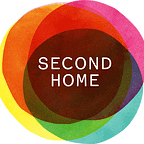Lessons on… Improving The Way We Work with Innovation Consultant Jonas Altman
Jonas Altman, Founder of award-winning innovation firm Social Fabric, joined us for a Breakthrough Workshop on how to best direct your time and energy at work.
Breakthrough is designed to give you the tools and inspiration to help make your dent in the universe. Join our mailing list, or follow us on @secondhome_io to always be in the know about Breakthrough events.
Along with running his design firm, Jonas is an international speaker, adjunct professor, and business coach. He travels the world leading talks and conversations on The Future of Meaningful Work, 21st Century Leadership, and more.
In this article, Jonas shares his secrets to getting more done with less time…
3 Questions Everyone Should Ask Themselves
If we want to change the way we work — we first need to start by looking inwards. And this needs to be happening all the damn time.
Here are three questions everyone should ask themselves, to learn how to improve the way you work.
1) Where do you get your energy from?
If you’re serious about becoming more productive — start by putting an end to the awful habit of multi-tasking. We fool ourselves in believing we’re doing many things simultaneously when in reality we’re just switching between tasks super fast.
“The attention economy has a financial incentive to keep us in a state of individualized anxiety and an obligation to constantly be reacting and producing”
Jenny Odell — author of How to do Nothing
Ask yourself “How can I best direct my energy today?” The answer, it seems, isn’t about doing things at the same time or even the right way — but by doing it right.
Second Home members report that they get fuelled up — not by grooming their social feeds — but by nature, by others, and by their own reflections. Intuitively we all know what gives us energy — we just need to be listening and constantly leveling up.
2) What does your work look like?
Swedish psychologist K. Anders Ericsson, best known for his research on experts, found that what separates stand-out musicians, artists, chess players, and others is not just how long and hard they practice — but how they train. Peak performers punch 60–90 minutes of highly focused training, immediately followed by short breaks. And, crucially, the maximum amount of focussed attention these high performers are capable of in a day is four and a half hours.
Computer scientist Cal Newport’s Deep Work popularised this research. Newport urges us to take on cognitively demanding activities in a completely distraction-free state. You’ll end up more creative and a hell of a lot more focussed. Promise. So instead of looking at how we spend our time, we might stay aware of how we’re funneling our working spirit.
Exercise #1: Make a list of your deep attention and hyper attention tasks, like so:
Deep attention lets us get on with doing our most demanding, important, and creative work. Think of researching, planning, strategizing, writing, creating, and other ‘ings’ that you know you do best when you’re deep in the flow.
Hyper attention lets us scan our surroundings and once helped keep us alive when we were hunter-gatherers. The point here is that you can perform these activities with less concentration and often using little brainpower. It’s OK if you fracture your attention because you don’t need a lot of it in the first place.
Now, intentionally batch your work into deep and hyper categories and keep them wholly distinct from one another. Like oil and water, they just don’t mix well.
3) When are you at your best?
Knowing your biological clock, or chronotype, is essential for doing great work. Like all living organisms, our bodies are governed by the same physiological principles in a 24-hour rhythm. You might think you’re an early bird or night owl but it’s more than likely you’re somewhere in the middle — a third bird. This means you’ll experience those dreaded afternoon dips sometime between 2 or 3 p.m.
Do your most challenging and important work (the deep attention tasks you just listed) when you’re most energized. Since your circadian rhythms are uniquely yours, you also need to tweak it such that you regularly hit your stride. Of course, life happens and it’s not always possible to rock your work to your rhythms — the notion is simply to try. Just knowing when you should and shouldn’t work is a sure-fire way to peak performance.
Exercise #2: Block out bursts (anywhere from 30 to 120 minutes) for your deep attention work, like so:
With your bursts mapped out — you now know your golden hours. Stick to them and, well, you’ll be gold.
Do the work that matters
Managing your energy and having the right attitude is important if you want to do great work. While our ancestors saw work as a sacrifice that made them morally worthy, we see work as a moral good that is worthy in and of itself. From caretaking to toy making, from bricklaying to pie-baking — the main driver comes from within.
Still, working more is surprisingly not the answer to getting more things done. This is precisely why famed philosopher Bertrand Russell — in a 1932 essay for Harper’s — advocated for a shorter workday.
The trick, it would seem, in doing more with less time, is to do the work that matters while staying in sync with yourself.
